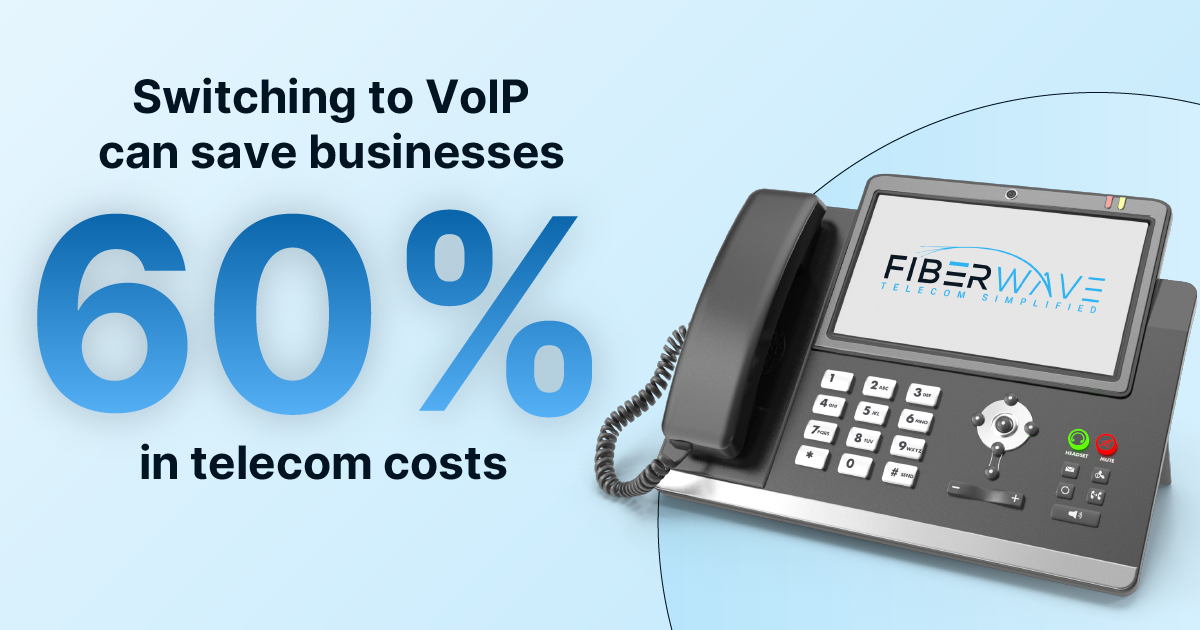January 1, 2024
PBX and VoIP: What’s Your Best Phone System Option?

Are you aware of all the options available with your business’ phone systems, like PBX and VoIP? Do you know which is best for your office phone system?
While PBX and VoIP systems offer similar core functionalities, there are differences in the range of features, scalability, and flexibility they provide. Both can cater to the essential needs of most businesses, but their suitability varies depending on your specific business requirements, size, and operational dynamic.
This article explores the differences between the two, so you can confidently make the right decision for your business based on your specific needs. We’ll break down both voice technologies, explore key differences in maintenance needs, cost, and benefits, and make recommendations for common business types.
What is PBX?
PBX stands for Private Branch Exchange, which is a private telephone network used within a company or organization. The primary purpose is to manage the internal and external communication lines and calls. It allows businesses to have more phones than physical phone lines and permits free calls between users within the PBX.
Originally, these systems were analog and required physical connections (through copper wires) and a manual switchboard.
- Call Routing: Directing incoming calls to the appropriate extension within the organization.
- Extensions: Providing multiple extension lines for different departments or users.
- Call Transfer: Allowing the transfer of calls from one extension to another.
- Voicemail: Managing voicemail for individual extensions.
- Conference Calling: Enabling multiple users to participate in a single call.
- Interactive Voice Responses (IVRs): Automated menus for guiding callers.
What about IP PBX?
IP PBX is a modern version of the traditional system that uses Internet Protocol (IP) data networks for managing the routing and switching of calls as well as for handling other messaging. IP PBX can be a physical piece of hardware, just like traditional PBX, but it can also be a software-based solution. Its distinguishing features include:
- Use of IP Networks: Utilizes LAN (Local Area Network) or the internet for call routing, reducing the need for separate networks for voice and data.
- VoIP Support: Supports Voice over Internet Protocol (VoIP), which means calls are transmitted as data over the internet, often resulting in cost savings and greater flexibility.
- Scalability: Easier to scale as adding lines or extensions often doesn't require physical wiring.
- Advanced Features: Besides typical PBX features, it often includes advanced functionalities like video conferencing, instant messaging, and mobile app integration.
- Unified Communications: Many IP PBX systems are part of a larger unified communications setup, integrating various communication technologies and platforms.
How PBX evolved into IP PBX
The evolution from traditional PBX to IP PBX has been a significant development in business communications, a shift from analog systems to digital, network-based technologies. Originally, PBX systems relied on manual switchboards and copper wiring but those systems evolved with the advancement of digital technology.
Now, IP PBX systems utilize the internet for making calls, using Voice over Internet Protocol (VoIP) technology. This allows IP PBX to work with standard computer hardware and seamlessly integrate with various business applications.
Plus, infrastructure needs have shifted considerably. Traditional PBX systems required extensive wiring and space. In contrast, IP PBX systems use existing internet networks, simplifying installation and reducing physical space requirements. Say goodbye to that closet of complex and temperamental hardware.
IP PBX is more flexible and easier to scale compared to traditional systems. Adjustments can be made through software configurations, not hardware changes. This flexibility supports remote work, allowing employees to connect from anywhere with internet access.
Moreover, while traditional PBX systems had high initial costs, IP PBX tends to be more cost-effective over time. It has lower maintenance requirements and allows the use of software-based phones, further reducing OpEx.
How does IP PBX compare to VoIP? Are they different?
IP PBX and VoIP are different, but both are key in digital telecommunication. IP PBX stands for Internet Protocol Private Branch Exchange. It updates old phone systems. It uses digital ways to manage calls inside a company. This change – old analog systems to IP PBX – means better connection and efficiency.
Some IP PBX setups also change digital signals right there. They keep connected to the regular phone network (PSTN). This mix gives you old phone system reliability with new digital benefits.
VoIP means Voice over Internet Protocol (allowing businesses to make calls over the internet). With VoIP, phones send digital info to a provider. This provider works with the PSTN as needed.
The difference is in maintenance and setup. VoIP lets the service provider handle the hardware. This makes it easier for businesses. But, IP PBX often needs your IT team to manage it on-site. This is because it's part of your company's own network and call system. So, IP PBX is more for internal management, while VoIP is for making calls over the internet. VoIP usually needs less equipment at your place.
What is VoIP?
VoIP, Voice over Internet Protocol, is a technology transforming the way we communicate. Unlike traditional telephone systems that transmit voice calls using analog signals through copper wires, VoIP converts your voice into digital data packets. These packets are then sent over the internet or any other IP-based network, allowing you to make calls using a broadband internet connection.
This method of communication offers several advantages. Primarily, it can lead to significant cost savings, particularly for long-distance and international calls, which are generally more expensive with conventional phone services. Additionally, VoIP comes with a variety of useful features such as voicemail, call forwarding, and the flexibility to use your phone number across multiple devices. This versatility made VoIP an increasingly popular choice for both personal and business telecommunications: a modern, efficient alternative to traditional phone lines.
For my business to use VoIP, do I first need a PBX system in place?

The differences between PBX and VoIP you need to know
Technology and Infrastructure
- PBX: Traditional PBX systems are essentially private telephone networks used within an organization. They require on-premise hardware and use standard telephone lines (PSTN - Public Switched Telephone Network) for making and receiving calls. PBX systems manage internal traffic between desk phones and handle external calls through physical phone lines.
- VoIP: VoIP technology, on the other hand, uses the Internet to transmit voice calls as data packets. Instead of relying on traditional phone lines, VoIP works over a broadband internet connection. This means it can be used with various devices like computers, VoIP phones, or even traditional phones with adaptors.
Cost and Maintenance
- PBX: Involves higher upfront costs because of the need for physical infrastructure and hardware. Maintenance and updates may require technical expertise and can be more costly over time.
- VoIP: Typically has lower setup and operational costs. Since calls are made over the internet, it reduces the expenses associated with long-distance and international calls. Maintenance is generally simpler and can often be handled by the service provider
Scalability and Flexibility
- PBX: Scaling a traditional PBX system can be complex and expensive as it often requires additional hardware. Customization and updates are also limited to the capabilities of the installed system.
- VoIP: Offers greater scalability and flexibility. Adding lines or features can usually be done easily and remotely, without the need for physical changes in the infrastructure. VoIP integrates easily with other digital tools and services.
Features and Functionality
- PBX: Provides basic telephony features such as call transfer, voicemail, and extension dialing. Advanced features might be limited and depend on the specific hardware.
- VoIP: Offers a wide range of features including, but not limited to, advanced voicemail, call forwarding, virtual numbers, caller ID, and the ability to integrate with other business applications like CRM systems.
Mobility and Accessibility
- PBX: Primarily restricted to the physical location where it's installed. Using the system remotely can be challenging.
- VoIP: Highly conducive to remote work and mobility. Users can make and receive calls from anywhere with an internet connection, making it ideal for modern, flexible work environments.
PBX and VoIP: Which is best for your business?
Small Businesses
Mid-Sized Businesses
Large Businesses
Other Considerations for PBX and VoIP Decisions
- Integration Needs: Businesses with a need to integrate their phone system with other business applications (like CRM software) might lean towards VoIP or cloud-based solutions.
- Existing Infrastructure: Companies with existing traditional PBX infrastructure might consider a hybrid solution to maximize their current investment.
- Growth Plans: For businesses expecting rapid growth, systems that offer easy scalability, like cloud PBX and VoIP, are preferable.
- Remote Work Compatibility: Companies with a remote or hybrid workforce will benefit more from VoIP or cloud-based systems because you can access them remotely.
- Integration Needs: Businesses with a need to integrate their phone system with other business applications (like CRM software) might lean towards VoIP or cloud-based solutions.
- Existing Infrastructure: Companies with existing traditional PBX infrastructure might consider a hybrid solution to maximize their current investment.
- Growth Plans: For businesses expecting rapid growth, systems that offer easy scalability, like cloud PBX and VoIP, are preferable.
- Remote Work Compatibility: Companies with a remote or hybrid workforce will benefit more from VoIP or cloud-based systems because you can access them remotely.
Need your phone system technology simplified?
With so many factors, it is hard to know if you are making the right decision. Cloud Voice? PBX? VoIP? At FiberWave, we work with thousands of companies and assist them in selecting the best solution tailored to their exact needs and goals. This gives us real-world data and proven expertise to ensure we can do the same for you.
With such an important decision to make, we can give you the confidence you are making the right one. Talk to us today and see how we can make your voice technology simple.